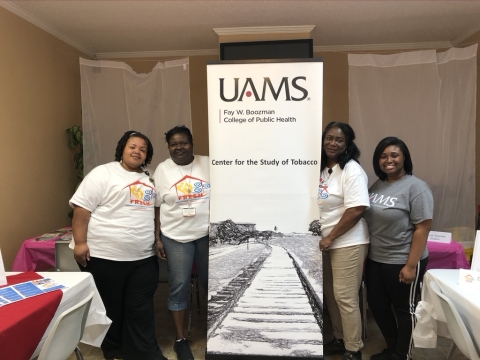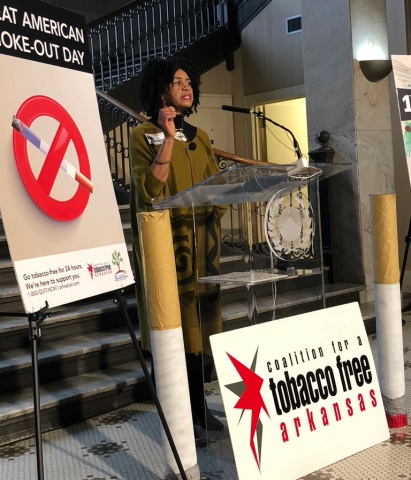FRESH Delivers: An Innovative Approach to Reducing Tobacco Use Among Rural Black/African American Smokers
Diseases or Conditions Being Studied
Tobacco cessation, tobacco dependence, food security
Communities of Focus
Smokers 21–75 years of age
Study Sites
Desha, Phillips, Chicot, or Lee Counties in Arkansas
Intervention or Treatment
- Smoking cessation counseling: Five 30-minute sessions during intervention months 1 through 5 to provide interpersonal level support for smoking cessation and real-time video motivational counseling
- Food delivery: Monthly delivery of food boxes in accordance with the number of persons in the household and caloric intake needed to support one week's worth of family meals.
Abstract

The long-term goal of FRESH Delivers is to fill a critical gap in knowledge on the role of a home-based food delivery social intervention in the elimination of tobacco-caused cancer health disparities. The central hypothesis is that smokers who receive real-time video-based motivational counseling and home-based food deliveries will have greater cotinine-verified 7-day point prevalence abstinence than those who receive real-time video-based motivational counseling alone or home food delivery alone. The rationale for this approach is that studies show increased odds of smoking cessation with increasing food security.
Prior studies have largely ignored intervening on social conditions that perpetuate disparities, resulting in repeated failures to reach African Americans in low-resource counties with effective interventions that help them quit smoking. A limited number of interventions that aimed to increase food security also resulted in increased fruit and vegetable consumption and decreased body mass index. But, none have examined the effects of providing food security as a means to help smokers quit.
Specific Aims
1. Test the efficacy of a social change intervention (home-based food delivery) on smoking abstinence using a 3-armed randomized controlled design.
2. Examine changes in measures of cigarette abuse liability.
3. Examine the extent to which home-based food delivery improves recruitment and retention of Black/African American smokers in the treatment conditions.

Our academic-community partnership – the University of Arkansas for Medical Sciences, Coalition for a Tobacco Free Arkansas, and the Arkansas Foodbank – has a strong collaborative foundation and experience in working together to reduce tobacco use in rural Arkansas Delta counties with high proportions of Blacks/African Americans. Multilevel interventions are needed to address persistent social conditions that potentially increase the abuse liability of smoking and impede successful quitting. Smokers who are more food insecure are less likely to quit smoking.
Our multidisciplinary team will use the Socioecological Model to test our central hypothesis: smokers who receive evidence-based real-time video-based motivational counseling and a social change intervention (home-based food delivery) will have greater cotinine-verified 7-day point prevalence abstinence than those who receive motivational counseling alone or social change alone. Social structural interventions that meet the immediate social needs of Black/African American smokers hold tremendous promise for improving Black/African American recruitment and retention into helpful cancer prevention community trials, increasing successful quitting, and reducing social disparities that perpetuate tobacco-caused cancer disparities.










